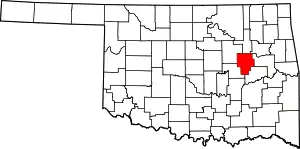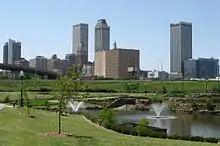Okmulgee, Oklahoma
Okmulgee is a city in, and the county seat of, Okmulgee County, Oklahoma.[5] The name is from the Muskogee word okimulgee, which means "boiling waters".[6] The site was chosen because of the nearby rivers and springs. Okmulgee is 38 miles south of Tulsa and 13 miles north of Henryetta via US-75.[7]
Okmulgee, Oklahoma | |
|---|---|
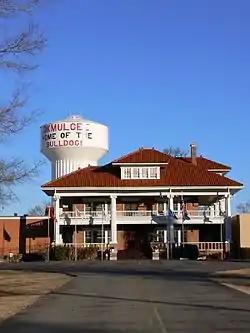 Elks Lodge and Water Tower in Okmulgee, originally the Wilson Mansion | |
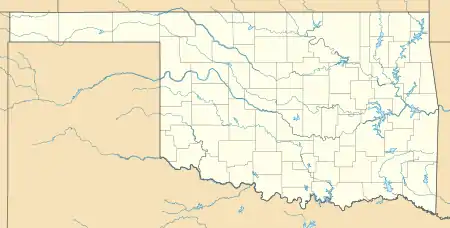 Okmulgee Location of Okmulgee in Oklahoma  Okmulgee Location of Okmulgee in the US | |
| Coordinates: 35°37′28″N 95°57′48″W | |
| Country | United States |
| State | Oklahoma |
| County | Okmulgee |
| Government | |
| • Type | Council-Manager |
| Area | |
| • Total | 19.88 sq mi (51.48 km2) |
| • Land | 17.10 sq mi (44.30 km2) |
| • Water | 2.77 sq mi (7.18 km2) |
| Elevation | 686 ft (209 m) |
| Population (2010) | |
| • Total | 12,321 |
| • Estimate (2019)[2] | 11,711 |
| • Density | 684.73/sq mi (264.37/km2) |
| Time zone | UTC-6 (Central (CST)) |
| • Summer (DST) | UTC-5 (CDT) |
| ZIP code | 74447 |
| Area code(s) | 539/918 |
| FIPS code | 40-55150[3] |
| GNIS feature ID | 1096218[4] |
| Website | okmulgeeonline.com |
History
Okmulgee has been the capital of the Muscogee (Creek) Nation since 1868, when it was founded following the Civil War. The Creek Nation began restoring order after that conflict. They had allied with the Confederacy during the war and needed to make a new peace treaty with the United States afterward as a result. They passed a new constitution and elected Samuel Checote as their first principal chief after the war.
In 1869, a post office (originally spelled Okmulkee) was established in the town, with Captain Frederick B. Severs appointed as the first postmaster. The name of the post office was officially changed to the present spelling on November 15, 1883. For seven years, beginning December 20, 1870, Okmulgee was the seat of government of all of what would become the State of Oklahoma, except for the Panhandle.[8]
Okmulgee became a transportation center. The St. Louis, Oklahoma and Southern Railway (later absorbed by the St. Louis – San Francisco Railway (“Frisco”) reached Okmulgee in 1900; this route still remains and is now operated by the BNSF Railway.[6][9] The Shawnee, Oklahoma and Missouri Coal and Railway (also later acquired by the Frisco) was built from Muskogee to Okmulgee in 1902-03, and lasted until abandoned in 1973.[6] And, the shortline Coalton Railway, later called the Okmulgee Northern Railway, operated between Okmulgee and Deep Fork carrying coal from the producing areas around Schulter, Coalton and Dewar from 1916 to 1964.[10]
The arrival of the railways triggered a building boom. By the time of Oklahoma statehood in 1907, the town had 2,322 residents and was named as the seat of Okmulgee County.[6]
Coal mined in the Henryetta area[11] and agriculture were the basis of the early economy. Discovery of oil at nearby Morris in 1907[11] stimulated expansion of Okmulgee, and attracted several new industries to town. These included three glass factories, a bottle factory, and foundry and machine shops. Five local refineries were operational by the early 1920s.[lower-alpha 1][6]
These industries were a catalyst for growth: The population was 4,176 in the 1910 census,[6] but the city boomed to approximately 35,000 people during the 1920s.[6] A newspaper article from this era claimed Okmulgee had more millionaires per capita than anyplace else in Oklahoma.[21] The Okmulgee Chamber of Commerce has said the town had more millionaires per capita than any other place in the entire country.[22]
But decreasing oil production and lower prices, the coming of the Great Depression, and other factors caused the population to shrink to 17,097 by the 1930 census.[6] The population then remained relatively stable for a time, increasing slightly to 18,317 by the 1950 census. In the postwar period, there was an urbanization shift of population toward larger cities and their suburbs because of job opportunities, and the city's population has declined again.[6] The population at the 2010 census was 12,321, a loss of 5.4 percent from the 2000 census figure of 13,022.[23]
Geography
Okmulgee is located at 35°37′28″N 95°57′48″W (35.624558, -95.963254).[24] According to the United States Census Bureau, the city has a total area of 33.8 square miles (33.2 km2), all of its land. It is located in the heart of Oklahoma's "Green Country", in the North East Quadrant of Oklahoma. Okmulgee is 38 miles south of Tulsa and 13 miles north of Henryetta via US-75.[7]
Demographics
| Historical population | |||
|---|---|---|---|
| Census | Pop. | %± | |
| 1910 | 4,176 | — | |
| 1920 | 17,430 | 317.4% | |
| 1930 | 17,097 | −1.9% | |
| 1940 | 16,051 | −6.1% | |
| 1950 | 18,317 | 14.1% | |
| 1960 | 15,951 | −12.9% | |
| 1970 | 15,180 | −4.8% | |
| 1980 | 16,263 | 7.1% | |
| 1990 | 13,441 | −17.4% | |
| 2000 | 13,022 | −3.1% | |
| 2010 | 12,321 | −5.4% | |
| 2019 (est.) | 11,711 | [2] | −5.0% |
| Sources:[3][25][26][27] | |||
As of the census[3] of 2000, there were 13,022 people, 5,135 households, and 3,291 families residing in the city. The population density was 1,015.7 people per square mile (392.2/km2). There were 5,948 housing units at an average density of 463.9 per square mile (179.1/km2). The racial makeup of the city was 58.85% White, 21.29% African American, 13.61% Native American, 0.29% Asian, 0.02% Pacific Islander, 0.53% from other races, and 5.41% from two or more races. Hispanic or Latino of any race were 1.83% of the population.
There were 5,135 households, out of which 30.0% had children under the age of 18 living with them, 42.7% were married couples living together, 17.6% had a female householder with no husband present, and 35.9% were non-families. 32.1% of all households were made up of individuals, and 14.0% had someone living alone who was 65 years of age or older. The average household size was 2.38 and the average family size was 3.00.
In the city, the population was spread out, with 25.4% under the age of 18, 12.7% from 18 to 24, 24.3% from 25 to 44, 21.1% from 45 to 64, and 16.5% who were 65 years of age or older. The median age was 36 years. For every 100 females, there were 93.3 males. For every 100 females age 18 and over, there were 87.5 males.
The median income for a household in the city, for the period 2013–2017 and in 2017 dollars, was $29,593. The per capita income for the city in the last 12 months, also for the period 2013–2017 and in 2017 dollars, was $17,141. About 26.8% are considered persons in poverty.[28]
Economy
Along with coal mining, agriculture supported the early economy. Cotton, corn, feed grains, and forage were the main crops. Truck farming, dairying, and poultry raising were also important.[6]
Discovery of the Morris and Lucky oil pools in 1907 brought prosperity to Okmulgee. It also attracted new manufacturing facilities to the city.[6]
In the 21st century, the most important business sectors in Okmulgee are: construction, retail trade, health care & social assistance, and accommodation & food services.[6] Okmulgee's major employers include the Muscogee (Creek) Nation, Anchor Glass (plant is in Henryetta), PACCAR Winch-Okmulgee, C.P. Kelco US Inc., Callidus Technologies, Inc., East Central Electric Cooperative, Great Plains Coca-Cola, Covington Aircraft, G&H Decoy (in Henryetta), and PolyVision.[29] Dlubak Glass Oklahoma runs a glass recycling facility.[30]
Government
_Nation_Council_House.jpg.webp)
City government
The City of Okmulgee government has a City Council composed of five members: a council member "at-large" who serves as the Mayor, and one council member from each of the City's four wards.[31] A City Manager is in charge of directing the day-to-day operations of the City in order to carry out the policies established by the City Council.[32] City Hall is at 111 E 4th Street downtown.[33]
County government
Okmulgee County government has three commissioners, one for each of the three Districts.[34] County services, including the District Court, Assessor, County Clerk, Jail, and Sheriff's office, are all located between 6th and 8th St, and Alabama and Seminole Avenues.[35]
Native American government
While the historical capitol of the Muscogee (Creek) Nation is the Creek Council House in downtown Okmulgee, the MCN's modern headquarters is at Okmulgee Creek Nation Tribal Complex at U.S. Route 75 and Loop 56.[36] Other MCN facilities in town include the College of the Muscogee Nation, a tribal college primarily for students seeking careers in the tribal sector, located at 2170 Raven Circle;[37] One Fire Casino at 1901 Wood Dr;[38] and, the Claude A. Cox Omniplex, cattycornered across from the Tribal Complex off U.S. 75 and Loop 56, which includes the Muscogee Dome multipurpose recreation center and other festival grounds and facilities.[39][40]
Education
Okmulgee Public Schools
Okmulgee Publish Schools include the Primary School, Dunbar, and High School.[41]
CareerTech
- Green Country Technology Center, part of the Oklahoma Department of Career and Technology Education system.
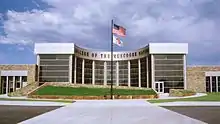
Post secondary
- College of the Muscogee Nation[42]
- Oklahoma State University Institute of Technology ("OSUIT"), also known as Oklahoma State University-Okmulgee, or informally, as Okmulgee Tech. The school site in 1943 was Glennan Military Hospital, constructed on land formerly belonging to the Creek Orphan Home.[43] The hospital originally treated WWII American servicemen, but later served wounded POWs.[43] In 1946 the site was sold to Oklahoma State Technical College to provide technical training for returning GIs.[43] This evolved into the current OSUIT.[43]
Parks and recreation
Recreational opportunities include Okmulgee Park and Dripping Springs Park, which offer RV and camping facilities.[44][45] The parks also offer swimming, fishing, and boating opportunities through the adjacent Dripping Springs Lake, which has 18 miles (29 km) of shoreline and 1,150 acres (4,700,000 m2) of water, and the separate Okmulgee Lake. The end of Okmulgee Lake features the Lake Okmulgee Dam Spillway Cascade, listed in the National Register of Historic Places in Okmulgee County, Oklahoma, which on occasions of heavy rains and high lake levels creates an intense man-made waterfall. Near Okmulgee is the Deep Fork National Wildlife Refuge.[46] Established in 1993, this approximately 9,000 acres (36 km2) of habitat for waterfowl along the Deep Fork River features opportunities for wildlife viewing such as along the Cussetah Bottoms Boardwalk, as well as fishing and certain archery, muzzle-loading, and small-game hunting opportunities.[47]
Lake Eufaula, Oklahoma’s largest lake,[48] is to the southeast.[49]
Okmulgee Municipal Park, at W 20th St. & S Seminole Ave., features a bike trail, walking track, playground, and soccer field.[50] Other municipal park facilities include Hawthorne Park (having a skate park, baseball park, and tennis court, among other facilities) at N Okmulgee Ave & W Fairfax St, Kiddy Lake Park at Cliff Dr & Parkview Dr, Noble Park at 13th & Delaware, Red Francis Park at S Woodlawn Ave & E 7th St, and Southeast Rotary Park at W 15th St & S Okmulgee Ave.[51]
The Okmulgee County Fairgrounds hosts the annual Okmulgee County Fair and other events through the year.[52][53]
Historic buildings
In November 1992, the Okmulgee Downtown Historic District (NRIS number 92001693) was added to the National Register of Historic Places ("NRHP") in Okmulgee County. The area is roughly bounded by Fourth Street, Eighth Street, Okmulgee Avenue and Frisco Avenue.[54] In support of Okmulgee's downtown, an organization has been formed called Okmulgee Main Street, one of the various national Main Street programs that aim to reenergize their respective downtowns and commercial districts through preservation-based economic development and community revitalization. This group is helping to propel the “Okmulgee Rising” movement that started in the city in 2014.[55] The process is aided in part by tax incentives for preserving historic properties.[56] Among the downtown structures is the Orpheum Theater at 210 W 7th St, which opened as the Cook Opera House on August 23, 1920 with 1,200-seat capacity.[57] This is the finest and last surviving of three grand theatres formerly located in Okmulgee.[58] The Orpheum's architecture, which is an elegant derivation of Spanish Baroque Revival, includes a colorful lobby which is the finest example in Oklahoma of the interior use of polychrome terra cotta.[58]
The historic Okmulgee County Courthouse, at 314 W. 7th,[59] was built in 1916 and is also NRHP listed.[60]
The Creeks initially built a two-story log council house to serve as their capital. This building burned in 1878 and was replaced with the stone Creek Council House building that stands today. Ownership of the building changed over the years, but in November 2010 the City sold the building back to the tribe for $3.2 million.[61] The building currently houses the Creek Council House Museum, with artifacts and exhibits about the history of the Muscogee tribe and the arts and crafts of other Native American tribes. The building is NRHP listed.[6]
The Okmulgee Public Library, 218 S. Okmulgee Avenue, completed in 1921, is a good example of Georgian Revival architecture, and is NRHP listed.[62]
In 2012 the Muscogee (Creek) Nation purchased the Okmulgee Golf Club, also known as the Okmulgee Country Club, at 1400 S. Mission Street, an NRHP listed location complete with the original 1920 golf course[63] and the 1925 clubhouse built using locally sourced limestone.[11] The MCN intends to turn that facility into a cultural center where events can be held.[64]
Historic churches include First Baptist Central Church, an historically black church built in 1915 and NRHP listed; Eastside Baptist Church, built in 1921 and NRHP listed; and, St. Anthony's, a Spanish Colonial Revival-style Catholic church built in 1927 and NRHP listed.
Historic mansions remaining from the boom days include the Okmulgee Elks Lodge at 701 S. Mission, being a 7-acre site that was originally the Wilson Mansion from 1922;[65] the Southern Mansion just off US-75 on Banyan Road, being the 1928 home for Creek orphan Katie Fixico;[66] the Kennedy Mansion from 1904 at 502 S. Okmulgee Avenue, which is NRHP listed;[67] and, the "Historic Okmulgee Mansion" at 1700 E. 6th Street,[68] originally the stately 1921 Italian Renaissance home built for oil producer Eugene R. Black,[69] now law offices.[68]
The Nuyaka Mission site is located on McKeown Rd. (aka E0945 Rd) just off N 120 Rd (aka N3850 Rd) approximately 15.7 miles west of the intersection of U.S. Route 75 and State Highway 56 (aka 6th Street) in Okmulgee, and is NRHP listed.
Events
Okmulgee is known for its annual Okmulgee Invitational Rodeo and Festival, which is the nation's oldest African-American rodeo and one of the state's longest running rodeos.[70]
The Okmulgee Farmer's Market has been running every year since 2013, and is open once a week (sometimes twice weekly) from May to October.[71]
Okmulgee has an annual Pecan Festival.[72] At the festival in 1989, a record was set for what was then the largest pecan pie in the world, being 40’ in diameter and using over sixteen-and-a-half tons of ingredients.[73] A mural in town commemorates the event.[74]
The Okmulgee County Fair is held annually (typically in September) at the Okmulgee County Fairgrounds, and includes commercial booths, exhibits, livestock shows, livestock judging, a horse show and cattle displays.[52][53]
Other family-oriented festivals and special events occur on a monthly schedule throughout the year, including the OrangeFest, Harvest Spoon Chili Fest, Muscogee Creek Nation Festival, Eats and Beats, and the bi-annual Airfest.[75]
Transportation
Okmulgee is served by U.S. Route 75, a major national north/south artery for much of its length, currently running from the Canada-US border at Noyes, Minn. to Dallas, Texas,[76] as well as by U.S. Route 62, which runs from the Mexico-US border at El Paso, Texas to Niagara Falls, New York near the Canada-US border.
Okmulgee is in the 10-county region served by the KI BOIS Area Transit System ("KATS"), a low-cost public bus/van service established in 1983 to help poorer communities, primarily in southeast Oklahoma, by providing access to Senior Citizen centers, groceries, medical services, and jobs.[77] The Muscogee (Creek) Nation partners with KATS on certain on-demand transportation services; and, Muscogee (Creek) Nation Transit provides regularly-scheduled trolley-style bus services to various locations around the city.[78] These services are not limited to tribal citizens.[78]
The city has the Okmulgee Regional Airport (originally called the Okmulgee Municipal Airport), designated OKM by IATA Code and KOKM by ICAO Code.[79] Construction of this airport was authorized in 1942 as a national defense project, and was completed on September 7, 1943. The main runway (18-36) is concrete-surfaced, 100' wide and 5,150' long.[80] Effective July 1, 2015, the airport is managed by the Tulsa Airports Improvement Trust.[81][82]
Commercial air transportation is available at Tulsa International Airport, about 47 miles to the north.[83]
Rail freight service is provided by BNSF Railway.[9]
Notable people
- Donald W. Burgess, meteorologist, tornado and weather radar expert
- Joyce Cobb, jazz and R&B singer
- Samuel Checote, (1819–1884), Creek chief
- Patrick Collins, NFL player
- Ron Gardenhire, manager of MLB's Detroit Tigers
- Jim House, Arkansas state legislator
- Wright King, actor, birthplace
- Dewey McClain, NFL player, labor leader, politician
- Mel McDaniel, country musician
- Edward H. Moore (1871–1950), United States Senator from Oklahoma (1943 - 1949), wealthy businessman
- Melvin Morris, United States Army Medal of Honor Recipient
- Gary P. Nunn, country music singer and songwriter
- David Obey, US Congressman, birthplace
- Oscar Pettiford, jazz bass player
- Will Sampson, artist and actor
- Bill Self, college basketball coach, birthplace
- Ted Taylor, singer
- David Thompson, Former NFL running back
In popular culture
The pilot for the FX comedy series Reservation Dogs from filmmaker Sterlin Harjo, which concerns four Native American teens in rural Oklahoma, was shot in Okmulgee.[84]
Notes
- The five refineries in Okmulgee, their build dates, and their initial processing capacities were: American Refining Co., 1907, 4,000 barrels per day (“bpd”); Indiahoma Refining Co., 1910, 3,750 bpd; Lake Park Refining Co., 1915, 2,000 bpd; Okmulgee Producing & Refining Co., 1916, 2,500 bpd; and, Allied Refining Co., 1917, 1,000 bpd.[12] The American Refining facility was acquired by Empire Refining in 1916,[13] and the Lake Park Refining facility was merged into Meridian Petroleum Company in 1920.[14] The Okmulgee Producing facility lasted the longest. It was acquired in 1920 by Phillips Higrade Refining Company,[15] a subsidiary of Waite Phillips Company,[16] and was a Phillips Petroleum Company operation from 1930 to 1966.[17] It was sold in 1966 to Okmulgee Refining Co., later called OKC Refining, Inc., a subsidiary of Oklahoma Cement Co., later called OKC Corp.[18] In 1981 the refinery was sold to Basin Refining Inc., and was finally closed permanently in 1982[19] in conjunction with Basin’s bankruptcy.[17] Cleanup of the area was led by Phillips Petroleum under state supervision starting in 1996, and the tract was reopened under Okmulgee Area Development Corporation ownership in 2012 as the Okmulgee Business Complex.[20]
References
- "2019 U.S. Gazetteer Files". United States Census Bureau. Retrieved July 28, 2020.
- "Population and Housing Unit Estimates". United States Census Bureau. May 24, 2020. Retrieved May 27, 2020.
- "U.S. Census website". United States Census Bureau. Retrieved 2008-01-31.
- "US Board on Geographic Names". United States Geological Survey. 2007-10-25. Retrieved 2008-01-31.
- "Okmulgee County, OK". National Association of Counties. Retrieved March 4, 2020.
- Bamburg, Maxine. "Okmulgee," Encyclopedia of Oklahoma History and Culture. Accessed June 16, 2015.
- Oklahoma Almanac. "Okmulgee."
- "Historical Okmulgee, Oklahoma – 1920-1929". Eric Standridge, Owlcation website. December 12, 2017. Retrieved September 22, 2019. This quotes an article by Judge A. L. Beckett, a pioneer of Indian Territory days and an authority on Creek affairs, published in the Okmulgee Times-Democrat on September 26, 1926.
- "Oklahoma 2018-2020 State Railroad Map" (PDF). Oklahoma Department of Transportation. Retrieved January 26, 2021.
- "Refuge Racoon's Words on Wildlife, I Hear the Train A'Coming" (PDF). Henryetta Free-Lance, January 26, 2018 (accessed on eTypes Archives). Retrieved January 26, 2021.
- Kieffer, Beth (2016). Images of America: Okmulgee. Arcadia Publishing. p. 55-63. ISBN 978-1-4671-1551-3.
- Cross, Roy (1919). "Handbook of Petroleum, Asphalt and Natural Gas, page 48". Retrieved April 24, 2020.
- "Fuel Oil Journal, July 1916, pages 14 and 24". Retrieved April 24, 2020.
- "Meridian Petroleum Company". American Oil & Gas Historical Society. Retrieved April 24, 2020.
- While the cited Oildom article names the refinery purchaser as Waite Phillips’ recently-organized “Phillips-Highway Refining Company,” the “Highway” part appears to be a typo or misunderstanding. All other sources point to the refinery owner as the “Phillips Higrade Refining Company,” a subsidiary of Waite Phillips Co., organized in July 1920 (see subsequent footnote). "Oildom, Volume 11, No. 8, August 1920, p34". 1920. Retrieved April 24, 2020.
- "The Oil Weekly, June 10, 1922, p. 24". 1922. Retrieved April 24, 2020.
- "Complex cleanup restores old refinery site". Oil and Gas Journal, May 31, 1999. Retrieved April 24, 2020.
- "OKC Corp. and Subsidiaries v. Commissioner, 1984". leagle.com. Retrieved April 24, 2020.
- "Okmulgee Refinery Workers Laid Off in Shutdown". Bob Vandewater, The Oklahoman, July 3, 1982. Retrieved April 24, 2020.
- "Business complex developing on former Okmulgee refinery site". Rhett Morgan, Tulsa World, November 13, 2015. Retrieved April 24, 2020.
- "Okmulgee Rising: What is Community?". Daniel Morris, Recovery in Oklahoma, LLC website, posted August 24, 2014. Retrieved September 22, 2019.
- "Most Millionaires/Capita to Down & Out—Can They Come Back?". Jack Shultz, BoomtownUSA, May 19, 2005. Retrieved May 16, 2020.
- "US Gazetteer files: 2010, 2000, and 1990". United States Census Bureau. 2011-02-12. Retrieved 2011-04-23.
- "Number of Inhabitants: Oklahoma" (PDF). 18th Census of the United States. U.S. Census Bureau. Retrieved 22 November 2013.
- "Oklahoma: Population and Housing Unit Counts" (PDF). U.S. Census Bureau. Retrieved 22 November 2013.
- "Incorporated Places and Minor Civil Divisions Datasets: Subcounty Population Estimates: April 1, 2010 to July 1, 2012". U.S. Census Bureau. Archived from the original on June 11, 2013. Retrieved 25 November 2013.
- "Quickfacts, Okmulgee city, Oklahoma". US Census Bureau. Retrieved October 3, 2019.
- "Okmulgee Area Major Employers". Okmulgee Area Development Corporation. Okmulgee Area Development Corporation. Retrieved 6 January 2017.
- "Dlubak Glass Oklahoma". Dlubak Glass. Retrieved January 9, 2021.
- "City Council". OkmulgeeOnline.com. Retrieved September 23, 2019.
- "City Administration". OkmulgeeOnline.com. Retrieved September 23, 2019.
- "City Hall". OkmulgeeOnline.com. Retrieved September 23, 2019.
- "Okmulgee County, OK". Local Technical Assistance Program of Oklahoma State University. Retrieved September 23, 2019.
- "Okmulgee County". OkmulgeeOnline.com. Retrieved September 23, 2019.
- "Muscogee (Creek) Nation Tribal Capital Complex" (PDF). Muscogee (Creek) Nation Geospacial Department, Geographic Information Systems. Retrieved October 14, 2020.
- "Academic Achievement. Native Values". College of the Muscogee Nation. Retrieved September 23, 2019.
- "Where It's OK to Play with Fire!". One Fire Casino. Retrieved September 23, 2019.
- "Touring the Tribes? Where to go in northeast Oklahoma". Kelsy Schlotthauer, Tulsa World, May 11, 2019. Retrieved October 15, 2020.
- "Muscogee (Creek) Nation frustrated by new building's closure". Susan Hylton, Tulsa World, January 20, 2013. Retrieved October 15, 2020.
- "Home". Okmulgee Public Schools. Retrieved December 28, 2020.
- "FAQ." College of the Muscogee Nation. (retrieved 27 Dec 2010)
- Kieffer, Beth (2016). Images of America: Okmulgee. Arcadia Publishing. pp. 91–92. ISBN 978-1-4671-1551-3.
- "TravelOK Website--Dripping Springs Lake". Retrieved 2019-09-26.
- "TravelOK Website--Okmulgee & Dripping Springs Lake & Recreation Area". Retrieved 2019-09-26.
- "U.S. Fish and Wildlife Service website, Deep Fork". Retrieved 2011-06-15.
- "TravelOK--Deep Fork". Retrieved 2011-06-15.
- "Lake Eufaula". TravelOK.com. Retrieved April 3, 2020.
- "Okmulgee, Oklahoma". Google Maps. Retrieved April 3, 2020.
- "Okmulgee Municipal Park". OkmulgeeOnline. Retrieved October 19, 2019.
- "Facilities". OkmulgeeOnline. Retrieved October 19, 2019.
- "Okmulgee County Fair". TravelOK.com. Retrieved December 28, 2020.
- "Okmulgee County Fairgrounds". Facebook. Retrieved December 28, 2020.
- National Register Properties in Oklahoma. Accessed August 18, 2017.
- "Okmulgee Rising". Okmulgee Main Street. Retrieved September 23, 2019.
- "Tax Incentives for Preserving Historic Properties". National Park Service. Retrieved September 24, 2019.
- "Orpheum Theater". CinemaTreasures. Retrieved February 21, 2020.
- "The Orpheum Story". Okmulgee Orpheum Theater. Retrieved February 21, 2020.
- "Okmulgee County". Oklahoma Supreme Court Network. Retrieved September 23, 2019.
- "Images for Okmulgee County, Oklahoma". CourtHouseHistory.com. Retrieved September 23, 2019.
- Sara Plummer, "Tribe regains historic Council House", Tulsa World, November 15, 2010.
- "National Register of Historic Places Nomination Form, Okmulgee Public Library". National Park Service. Retrieved September 22, 2019.
- "Creek Nation plans to buy Okmulgee Golf Club". Susan Hylton, Tulsa World, January 20, 2013. Retrieved September 23, 2019.
- "Muscogee (Creek) Nation plots headquarters expansion, other construction". Molly M. Fleming, The Journal Record, February 5, 2019. Retrieved September 23, 2019.
- "Lodge 1822 Home, Facilities, Okmulgee Elks Lodge". Elks website. Retrieved September 22, 2019.
- "Okmulgee historic Southern Mansion for sale". Ralph Marler, Tulsa World, September 29, 2002. Retrieved September 22, 2019.
- "National Register of Historic Places Registration Form, Kennedy Mansion" (PDF). National Park Service. Retrieved September 22, 2019.
- "Okmulgee Office". South County Law Firm. Retrieved October 14, 2020.
- "1921 Italian Renaissance". Old House Dreams, posted April 29, 2019. Retrieved September 22, 2019.
- "TravelOK Website-- Okmulgee Invitational Rodeo and Festival". Retrieved 2019-09-29.
- "Farmer's Market". Okmulgee, Oklahoma. Retrieved October 1, 2020.
- "Pecan Festival". Okmulgee Chamber of Commerce. Retrieved October 7, 2019.
- Kieffer, Beth (2016). Images of America: Okmulgee. Arcadia Publishing. p. 113. ISBN 978-1-4671-1551-3.
- "The World's Largest Pecan Pie - Okmulgee, OK". Waymarking.com. Retrieved October 7, 2019.
- "Living in Okmulgee". Okmulgee Area Development Corporation. Retrieved April 3, 2020.
- "U.S. Highway 75 Endpoints". Archived from the original on 2011-07-03. Retrieved 2011-06-15.
- "Oklahoma Department of Transportation Website-- KI BOIS Area Transit System". Retrieved 2011-06-15.
- "Tribal Transportation Program". Muscogee (Creek) Nation. Retrieved September 30, 2019.
- List of airports by IATA code: O
- "Okmulgee Airport website, History". Retrieved 2011-06-15.
- "Casey Smith, Tulsa Airport board approves operation deal with Okmulgee Regional Airport, May 15, 2015". Tulsa World. Retrieved 2019-09-26.
- "Larry Levy, Contract awarded for airport control tower, May 18, 2016". Tulsa World. Retrieved 2019-09-26.
- "Tulsa International Airport to Okmulgee". Google Maps. Retrieved September 4, 2020.
- "FX comedy series 'Reservation Dogs' set in rural Oklahoma, written by Oklahoma filmmaker". Jimmie Tramel, Tulsa World, December 22, 2020. Retrieved December 24, 2020.
External links
| Wikimedia Commons has media related to Okmulgee, Oklahoma. |
- City of Okmulgee
- Memoirs of Jeremiah Curtin in the Indian Territory ethnographer's notes of 1883 visits to Muskogee and Okmulgee; electronic record maintained by Library of Congress, accessed January 15, 2007.
- . Collier's New Encyclopedia. 1921.
